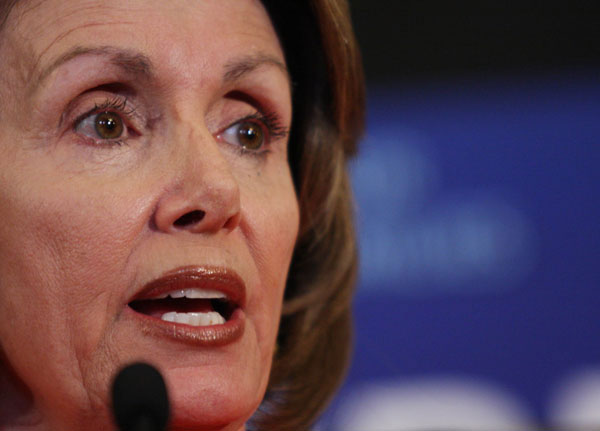Pelosi’s Election Year Strategy « The Washington Independent
Jul 31, 2020298.9K Shares3.9M Views
Speaker of the House Nancy Pelosi (D-Calif.) (WDCpix)
Here we go again.
Just two months after House Democrats angered liberal voters by agreeingto controversial warrantless wiretapping legislation, party leaders are signaling compromise on another issue that could alienate many progressive supporters: offshore oil drilling.
It wasn’t meant to be this way. Democrats, led by House Speaker Nancy Pelosi (D-Calif.), have railed against a drilling expansion for months. Yet in a tense election year, when public perception becomes political reality and nuance is often the first to flee the debate, Republicans seem to have sold their version of the drilling tale more effectively.
Illustration by: Matt Mahurin
Over the weekend, Pelosi indicated she will accept increased drilling as part of a larger energy package.
“[The bill] will consider opening portions of the outer continental shelf for drilling,” she said during the Democrats’ weekly radio address Saturday, “with appropriate safeguards, and without taxpayer subsidies for big oil.”
On the surface, Pelosi’s comments mark a sharp reversal for the San Francisco Democrat, who until recently had fought the drilling expansion tooth and nail, calling it “a decoy,” “a hoax” and “not a solution.”
But environmentalists need not weep just yet. Pelosi also emphasized that she plans to load the Democrats’ energy bill with a number of party priorities that have failed to pass the House this year. Provisions to release some of the nation’s emergency oil reserves, cut public transit costs and eliminate billions in subsidies to major oil companies, for example, could face fierce opposition from congressional Republicans and the White House. Indeed, House Minority Leader John Boehner (R-Ohio) issued a statementaccusing Pelosi of designing a plan destined to fail.
“While the speaker now claims to embrace a comprehensive energy plan that includes more conservation, more innovation and more American energy production,” Boehner said, “the fact is her new effort appears to be just another flawed plan that will do little to lower gas prices.”
The episode is just the latest in the partisan chess match over energy policy that’s dominated Congress’s August vacation and is poised to play a major role in November elections. Led by the White House and Sen. John McCain, the likely GOP presidential nominee, Republicans have blasted Democratic leaders for their refusal to lift the decades-old drilling ban — even in the face of towering fuel costs.
Democrats, led by Pelosi, have favored a move toward renewable fuels. They have been quick to point out that expanding drilling would provide no immediate benefit for consumers — a position supported by the Bush administration’s own Energy Dept.
Last year, the Energy Information Admin., a research branch of the Energy Dept., found that increasing offshore drilling would have no significant effect on either domestic production or gas prices before 2030. Yet, while the EIA may be the authority on the issue, the Republicans’ “drill here, drill now” slogan has proven the easier sell to voters weary of $114 per barrel oil.
Indeed, public-opinion polls indicate that most Americans see offshore drilling as a viable way to cut costs at the pump. Faced with a shifting public sentiment — not to mention the looming elections — Democrats have begun to embrace the concept, if only to place the blame on Republicans if the larger energy package eventually fails due to GOP opposition.
Last month, a group of 10 senators — five Democrats and five Republicans — introduced legislation containing pet provisions of each party. The compromise includes an offshore drilling expansion for Republicans, for example, and also eliminates major oil company subsidies, which Democrats support.
On Friday, Senate Majority Leader Harry Reid (D-Nev.) told reporters that the Senate’s bipartisan strategy — including the increased drilling — is “a step in the right direction.” Sen. Barack Obama (Ill.), the Democrat’s presumptive presidential nominee, has embraced the Senate package as well.
Highlighting the debate, more than 100 House Republicans have swept through Washington this month to take to the podium in the empty House chamber, where they’ve urged Pelosi to call Congress back into session for the sake of a drilling vote. The stunt has made headlines across the country, putting greater pressure on Pelosi and the Democrats to address the issue.
In some ways, the episode parallels that surrounding the wiretapping debate that consumed much of the year. Rallying behind Pelosi, House Democrats had for months rejected Republicans’ demands for telecom immunity, only to cave in the end for fear of a November backlash. Obama, once a vocal foe of immunity, also reversed course to support the final vote.
Environmentalists are holding out hope that the drilling saga will play out differently. They hope Pelosi’s change of position is, indeed, simply a political play intended to fail. Carl Pope, executive director of the Sierra Club, issued a statement Saturday in response to Pelosi’s radio address, maintaining that the debate itself will be enough to kill the drilling expansion.
“The upcoming debate in Congress,” Pope said, “will allow the truth to come out — that offshore drilling won’t lower gas prices today, tomorrow or a even a decade from now and will simply benefit Big Oil’s bottom line, instead of helping hard-working Americans.”

Rhyley Carney
Reviewer
Latest Articles
Popular Articles

